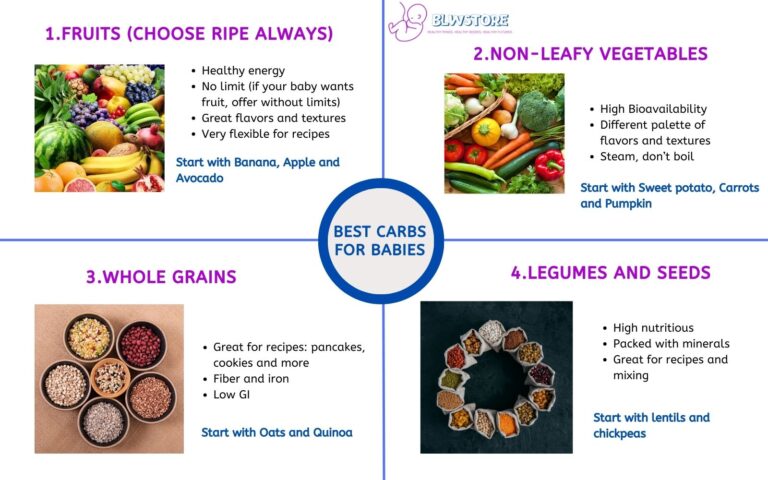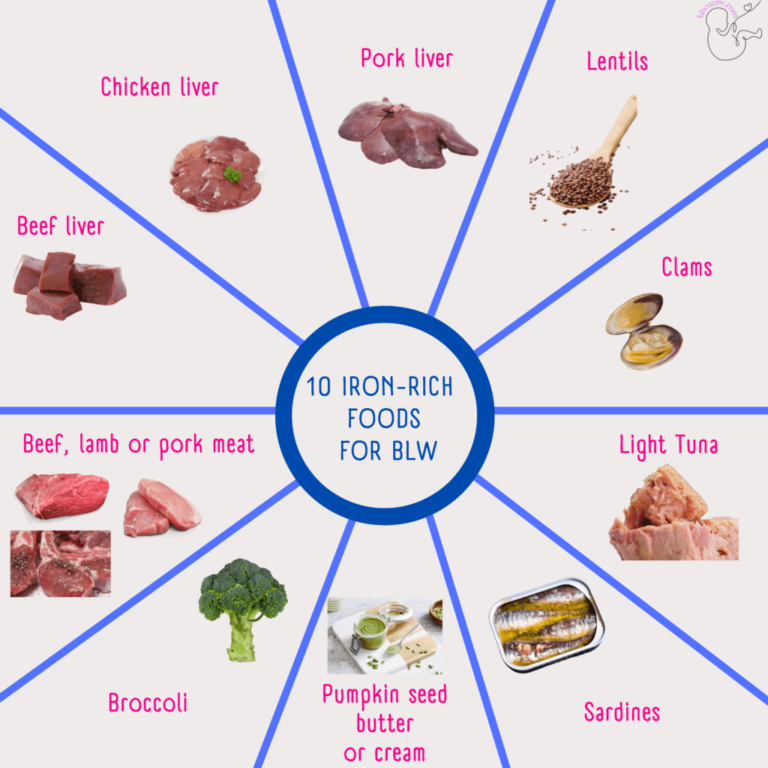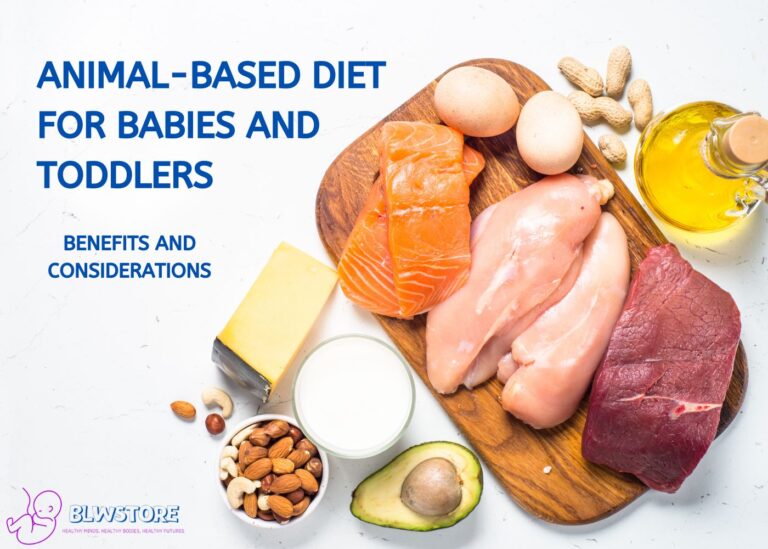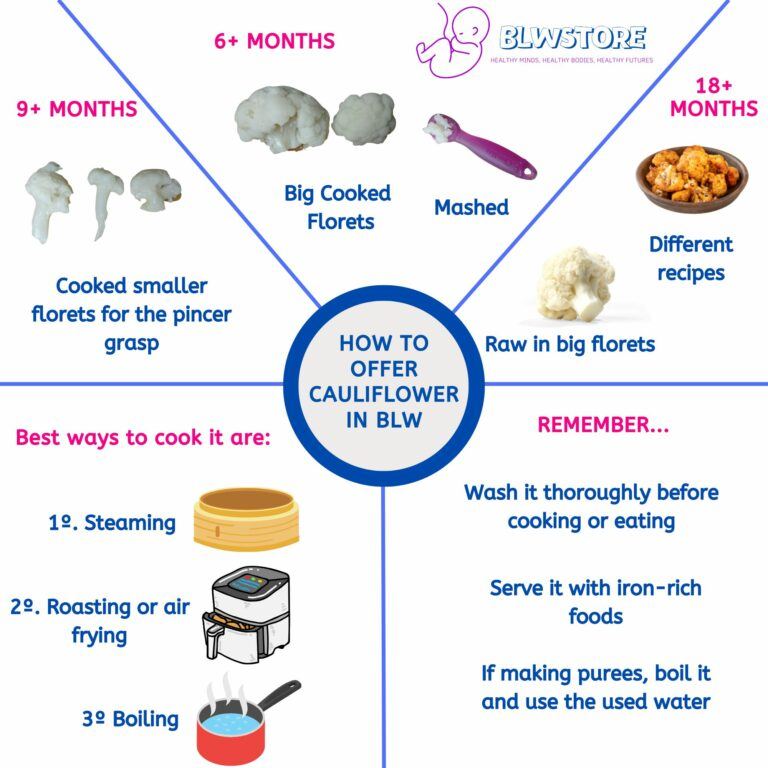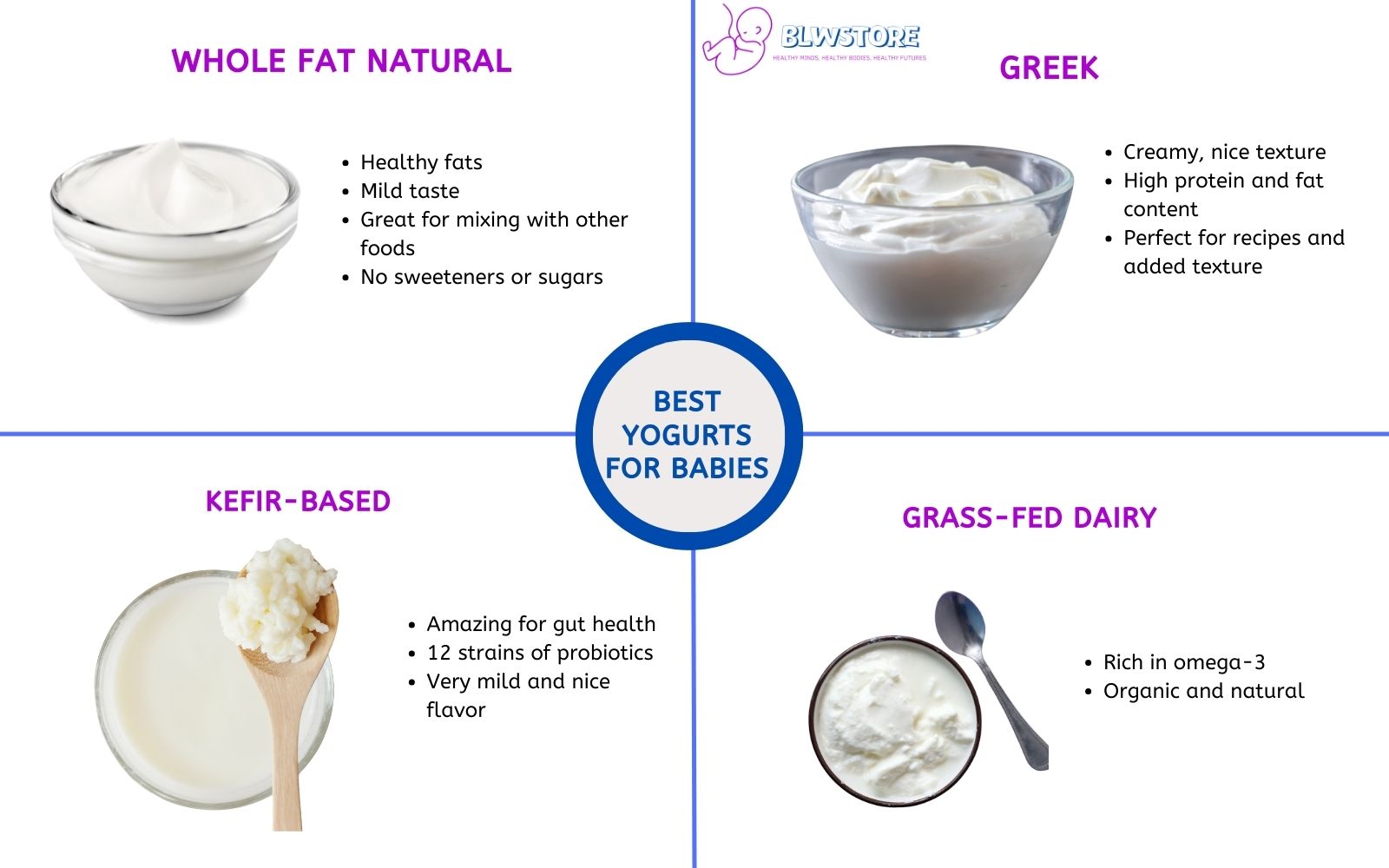
Did you know nearly 60% of parents introduce yogurt to their babies by nine months?
The array of yogurt types available may leave you wondering which is the best for a baby who is six months or older.
Don’t worry; we’ve got your back.
In this article, we’ll answer all your questions about yogurt for babies and toddlers, and we’ll tell you the best four types of yogurt for your little one.
Let’s get after it!
Remember, when introducing Yogurt or any kind of dairy product, always do it gradually. Start off with a tiny bit and keep an eye out for any signs of digestion issues or allergic reaction.
When Can Babies Eat Yogurt?
Babies can eat yogurt when they turn six months old. It’s at this age that they can start consuming solid foods.
- Why Wait Until Six Months?
Before the six-month mark, a baby’s digestive system is not fully developed to process yogurt’s active bacteria. Waiting for six months ensures their gut has matured enough to benefit from the yogurt’s nutritional value, specifically its active probiotics.
Don’t feel pressured to offer it at 6 months. Breast milk or formula are still the main sources of nutrients, and some parents, including us, prefer waiting until the 12-month mark to offer dairy products, and that’s completely okay.
- What If My Baby Has Dairy Intolerance?
Nearly 20% of babies have difficulty digesting cow’s milk, but can often tolerate yogurt
Even though yogurt is made from milk, it’s usually easier on the stomach due to the fermentation process, which breaks down the lactose. Of course, if your baby has a diagnosed milk allergy, they should avoid dairy products entirely, including yogurt, until your pediatrician advises otherwise.
| Age | Solid Food Introduction |
|---|---|
| 4-6 months | Babies at this age are getting to know textures and tastes. If given solid food, it should be very well blended. |
| 6-7 months | This is when you can start adding soft lumps and thicker foods, including yogurt, into your baby’s diet. |
| 7-9 months | Babies are now able to handle mash and soft chopped foods. |
Be sure to observe your baby’s reaction when introducing yogurt. It’s normal for them to take some time to get used to new textures and tastes. Still, any sign of discomfort, rash, or digestive upset might indicate an intolerance or allergy, warranting an immediate visit to the pediatrician.
4 Best Yogurts for Babies and Toddlers
1. Whole Fat Natural Yogurt
Whole Fat Natural Yogurt is a great place to start for babies dipping their metaphorical toes into the world of yogurt. Packed to the brim with essential nutrients like calcium and vitamins, it can serve as a splendid supplement to your baby’s diet.
But first, what exactly is Whole Fat Natural Yogurt?
In short, it’s yogurt made directly from whole milk and fermented with live bacteria. It contains no added sugar or artificial flavors, making it a healthy option for your little one.
Here are some benefits:
- High in Healthy Fats: As its name implies, Whole Fat Natural Yogurt is rich in healthy, saturated fats that are crucial for brain development in your little one.
- Excellent Source of Probiotics: This yogurt contains live bacteria that promote a healthy gut and better digestion.
- Rich in Essential Nutrients: It is abundant in calcium and several vitamins that are instrumental in your baby’s growth.
It can be served plain or mixed with pureed fruit for some added flavor.
2. Greek Yogurt
Greek yogurt is high in beneficial proteins, which are great for muscle development, fats for cells and brain, and a small amount of carbohydrates, which energy to your growing baby. Plus, the probiotics present in this yogurt are beneficial for their digestive systems.
Steer clear of the ones packed with added sugars. Natural or plain Greek yogurt is the safest pick. It might taste tangy, but you can always sweeten it with fresh, mashed fruits. Berries are a great option, loaded with antioxidants; they add natural sweetness and nutrients.
Let’s not forget about portion sizes. Start with a spoon or two, and increase it gradually. Pay close attention to how your baby reacts when trying it for the first time. Some babies might have allergic responses to Greek yogurt if they’re allergic to cow’s milk proteins. In such cases, you should consult your pediatrician.
Quick Tip: Have fun with Greek yogurt! You can get creative and blend it with different varieties of fruits, vegetables, and even child-safe spices, to offer your baby varied taste experiences and an array of nutrients.
3. Kefir-Based Yogurt
Kefir is a fermented milk product similar to yogurt, but its consistency is more liquid-like, and it contains even more probiotics. Kefir-based yogurt can contain up to 12 different strains of probiotics. This makes it a superhero in aiding digestion and strengthening the immune system.
One of the perks of Kefir-based yogurt is its taste. It has a mildly sweet and slightly tangy flavor which most babies enjoy. So rest assured, while providing notable health benefits, you won’t have to wrestle too much to get your little one to eat it.
- Health Benefits: Kefir-based yogurt is loaded with essential vitamins like vitamin B12, calcium, and phosphorus. It also contains almost three times the amount of probiotics found in regular yogurts. These probiotics can be beneficial to your baby’s digestive health.
- Tips for Serving: Kefir-based yogurt can be served solo or mixed with purées. If you want to ease your baby into this new flavor, consider mixing it into fruit or vegetable purées. Also, you can enhance its nutritional value by adding some crushed nuts or seeds. Do remember though, all new foods must be introduced carefully and individually to check for any potential allergies.
- Things to Watch Out For: Due to its high probiotic content, introducing Kefir-based yogurt to your baby’s diet should be gradual and in small amounts. Unexpected bowel movements may occur initially, but that is a common effect when introducing probiotics into one’s diet. Always ensure you choose a Kefir-based yogurt that does not contain added sugar or artificial sweeteners.
4. Grass-Fed Dairy Yogurt
Thinking of something a bit closer to nature for your little one? Then, Grass-Fed Dairy Yogurt may be the right fit for your baby’s budding palate. This type of yogurt is produced from cows’ milk that graze on grass rather than being fed on grains.
What makes it special? Well, grass-fed dairy yogurts are known to have higher concentrations of omega-3 fatty acids, which contributes greatly to your baby’s brain development. Additionally, it has good amounts of conjugated linoleic acid (CLA), a fatty acid that boosts immunity and overall health.
- Best for: Parents seeking organic, natural options with added health benefits for their baby
- Health benefits: Rich in omega-3 fatty acids and CLA to boost brain development, immunity, and overall health It’s important to note that because it is made from cow’s milk, grass-fed dairy yogurt can be introduced to your baby’s diet only after they reach six months of age. Be sure to start with small amounts first and gradually increase it while carefully observing for any signs of intolerance or allergy.
Are there specific brands of yogurt recommended for babies?
Of course! While there’s no “one-size-fits-all” when it comes to yogurt brands for your little one, there are definitely some top contenders in the industry that have a track record of providing nutritious, baby-friendly products.
These brands have a strong focus on producing high-quality, natural yogurts without any added sugars or artificial flavors, and many of them offer whole fat, Greek, kefir-based, and grass-fed dairy options, perfect for your 6 month or older baby.
- Stonyfield Organic: Stonyfield offers a ‘YoBaby’ line specifically designed for babies, which is made with whole milk and comes in several flavors.
- Siggi’s: Siggi’s is committed to making high-quality, low-sugar Greek yogurts and skyr, an Icelandic-style yogurt. Their products usually contain more protein and less sugar compared to other brands.
- Wallaby Organic: Wallaby offers an excellent line of Greek and Australian style yogurts. They are committed to using only organic milk.
- Cabot: Cabot is an excellent choice if you are looking for grass-fed dairy yogurts. They have a quality line suitable for babies and toddlers.
- Lifeway: Lifeway is one of the most popular kefir-based yogurt brands out there. Their probiotic smoothies are made with whole milk and are packed with various beneficial cultures.
These brands are merely suggestions based on their commitment to quality and nutrition. As always, it’s important to carefully read the labels and look out for any unnecessary additives. When in doubt, it never hurts to get a pediatrician’s recommendation.
How often should I give my baby yogurt?
Although yogurt is packed with excellent nutrients, it should not be fed to your baby more than once a day to begin with. Gradual introduction allows your baby’s digestive system to adjust. Begin with a spoonful and gradually increase the amount over several weeks if your baby responds well to it.
A good rule of thumb is to aim for 2 small servings of dairy per day for babies 6 months of age or older. As they get older, this can increase to 3-4 servings per day. A serving of yogurt for a baby is about 1/4 to 1/2 cup.
Here are some tips to integrate yogurt into your baby’s diet:
- Combine it with fruits: For a nutritionally complete and tasty meal, you can mix yogurt with various baby-friendly fruits like bananas or peaches.
- Use yogurt in recipes: You can use yogurt as an ingredient in homemade baby food recipes, such as healthy pancakes or muffins.
- Serve as a snack: Instead of high-sugar snacks, choose a small serving of yogurt.
How to choose the best yogurt for my baby at the supermarket?
- Read the Ingredients: The first thing to look for is the list of ingredients. The shorter the list, the better. Ideally, it should contain only milk and live bacteria cultures. Watch out for additives, preservatives, or sweeteners.
- Check the Fat Content: Babies require a significant amount of fat for their brain development. Choosing a yogurt that is full fat or whole milk is crucial during the early stages of life.
- Pick the Right Type: As you already know from above, Whole Fat Natural Yogurt, Greek Yogurt, Kefir-Based Yogurt, and Grass-Fed Dairy Yogurt are all excellent choices. Choose whichever type your baby seems to like the most.
- Consider Organic: If it’s within your budget, consider buying organic yogurt. It’s produced without harmful pesticides, making it a healthier option for your baby.
Should I choose organic yogurt for my baby?
Indeed, considering organic yogurt for your little one might be a great option.
First and foremost, organic yogurt is often a bit more expensive than conventional yogurt due to the farming methods used. However, that higher cost also comes with certain benefits. Organic yogurt is typically:
- Free from antibiotics: Conventional dairy products sometimes contain traces of antibiotics given to cows, which can lead to antibiotic resistance in humans. Organic farming prohibits the use of antibiotics, so organic yogurt is usually clear of them.
- Free from growth hormones: Non-organic farms frequently use growth hormones to increase milk production in cows. These hormones can make their way into the milk and, subsequently, into the dairy products made from it. Organic farms do not use growth hormones, so this concern is eliminated.
- Richer in nutrients: Some studies suggest that organic milk can have higher levels of beneficial nutrients such as omega-3 fatty acids, compared to conventional milk. Higher nutrient density may translate into more nutritional benefit per serving of yogurt for your baby.
Even though organic yogurt has its perks, that does not mean that conventional yogurt is a bad option. If you’re choosing between an organic yogurt full of added sugars and a conventional plain yogurt, the second is still the healthier choice.
Remember, the decision to choose organic yogurt also depends on other factors including your budget and what’s available in your local stores.
Lastly, keep these key points in mind:
- Always choose plain yogurt: Whether or not it’s organic, always stick to plain yogurt with no added sugars, artificial flavors, or colors.
- Check the fat content: Babies need fats for their development, opt for whole-fat or full-fat yogurt, whether it’s organic or not.
- Consider taste: Remember that babies have sensitive palates; a mild-tasting yogurt could be the best option to avoid turning them off.
We’re Maria and Alberto, a married couple and educators who are nutrition enthusiasts. Even before we had kids, we were already crazy about nutrition.
We’d read scientific articles, watch videos from nutritionists, and spend hours listening to nutrition podcasts.
Today, we continue doing this, but in a different way, as we’ve learned to sift through the noise and trends. Nutrition, like any other field of knowledge, the more you read and learn, the more you develop a comprehensive understanding of reality, and that’s what has happened to us.
Before having our first child, we focused on learning everything we could about child nutrition, using the same techniques we had already employed, backed by our extensive knowledge in nutrition.
Our mission is to help other parents with their children’s nutrition, to help them become the best versions of themselves.
If we are what we eat and drink, which is absolutely true, let’s do it right!


